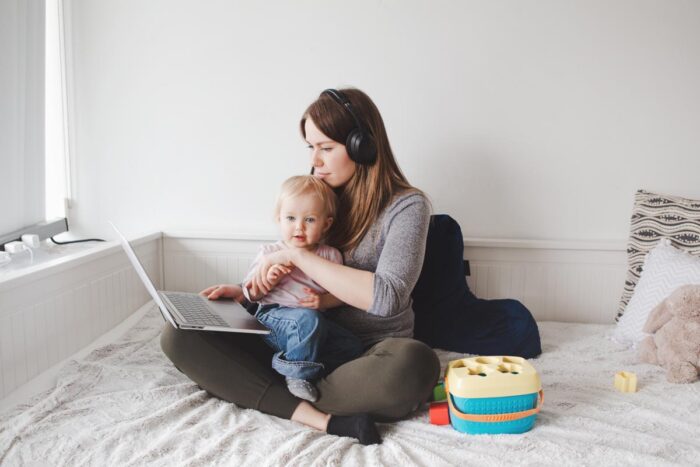Financial grants are provided for specific purposes for single mothers, not to provide general financial support. Grants are awards offered to cover the expenses of a particular activity, such as getting an education. There are many government grant programs that do not focus on individuals.
They give money to organizations that assist people in need, such as single mothers. Individuals may receive funding for specific activities through grant programs. The application process for some grants is quite straightforward, while others require more effort.
Benefits Of Government Grants For Single Moms
You will receive assistance from the government as a cash payment or another benefit that you can use to overcome financial hardship. Your situation and previous employment history may determine whether government grants are available to single moms.
1. Food Benefits
Unemployed individuals and single mothers (and their children) are among the vulnerable populations in society who receive government food assistance. Single mothers facing hunger in the United States can receive assistance from the following federal programs.
- Low-income single moms can receive SNAP benefits when they need groceries in a timely, targeted, and temporary manner.
- TEFAP provides USDA commodities to food banks or other emergency food providers to help single moms suffering from short-term hunger.
- Low-income seniors (including single mothers) can receive a monthly package of USDA commodities as part of the Commodity Supplemental Food Program (CSFP).
- Children and adults residing in designated child and adult care centers (CACFP) are provided nutritious meals and snacks daily through the Child and Adult Care Food Program (CACFP).
- The National School Lunch Program (NSLP) provides a nutritionally balanced lunch to eligible students each day.
- Breakfast is provided each school day to qualified students through the School Breakfast Program (SBP). Schools and residential childcare facilities that administer nonprofit breakfast programs can apply for reimbursement under this program.
- The Summer Food Service Program (SFSP) offers a free summer meal and snack program to low-income children.
- Low-income, at-risk women and infants are provided nutritious foods and nutrition education through the Women, Infants, and Children (WIC) program.
2. Temporary Cash Assistance Benefits
Low-income single mothers are sometimes assisted with once-off cash loans through programs such as TANF, also known as Welfare. These loans pay for necessities such as child care, housing, and food.
TANF assistance comes in two forms. The grants fall into two categories: family grants and child grants. Family grants assist the entire family, as opposed to child grants which only pay for the needs of a child. Single moms can spend monthly money on clothing, shelter, food, and other essentials.
3. Supplemental Security Income (SSI) Benefits
The Social Security Administration funds the SSI program with general tax revenues. In addition to meeting basic needs such as food, clothing, and shelter, it also provides monthly payments. The base monthly federal amount varies according to your living arrangement and countable income. There is no standard amount for everyone.
4. General Assistance (GA)
Single mothers with little income and resources who cannot work enough to support themselves can receive General Assistance.
5. Healthcare Benefits
Medical and dental care is made affordable and accessible to families with limited incomes through Medicaid and the Children's Health Insurance Plan (CHIP). Low-income people can access Medicaid through Medical Assistance (MA) programs offered by various states and counties.
Health plans are usually the primary source of health care for people with MA. MA members have access to a variety of health plans. Members without health insurance plans use fee-for-service health care billed directly to the state.
6. Unemployment Insurance Benefits
Unemployment insurance might be available to single mothers who have lost their jobs. States with federal funds administer this program. If you live in a different state, you may qualify for unemployment assistance, but you may not be eligible for unemployment aid in that state.
Unemployment insurance should be supplemented with emergency savings rather than relied upon exclusively to sustain people. Unemployment insurance can certainly prove beneficial to single mothers raising a family in poverty.
7. Housing Benefits
Building the country's social safety net also involves a high level of government investment in housing. Some single mothers can only avoid homelessness through Section 8 vouchers and public housing. As a result of these programs, single mothers can live off the streets in a safe and comfortable environment.
It is often overcrowded, so you could wait years before you receive benefits from Section 8 housing, one of the options available to single mothers. However, public housing provides housing for the elderly, the disabled, and low-income families instead of giving them vouchers.
8. Child Care Benefits
The federal government provides several different childcare programs for single mothers. The programs include state childcare assistance subsidies for single moms, public assistance daycare programs, and head start daycare.
This way, parents can find a job, go to school, or pursue a career training program while their children are in daycare. Income is taken into account when determining eligibility. A sliding scale is usually used to determine how much you pay. Those with higher incomes pay a higher rate than those with lower incomes.
9. Educational Benefits
Government spending on education is also relatively low in the United States. Federal Work-Study Grants, Pell Grants, and Federal Supplemental Educational Opportunity Grants are the primary grants the government can offer single mothers, aside from funding public schools.
Students from low-income families can take advantage of these programs to make college more affordable. The only way you can afford to send your children to school is through this method if you are raising your family by yourself.
You may also want to look at the various ways of getting free money through government hardship grants.
Frequently Asked Questions:
Government grants for single moms can provide financial assistance to cover various expenses, such as housing, childcare, education, and healthcare. These grants help alleviate financial burdens, making it more manageable for single moms to meet their families' basic needs and work towards financial stability.
Yes, government grants for single moms can improve access to education and job training. Programs like the Federal Pell Grant and Workforce Innovation and Opportunity Act (WIOA) support single moms in pursuing higher education or vocational training, enhancing their skills and employability, and ultimately increasing their earning potential.
Government grants can have a significant impact on the overall well-being of single moms and their families by providing essential financial support and resources. This assistance helps create a more stable living environment, reduce stress, and enable single moms to invest in their families' future. Access to education, healthcare, and childcare resources also contributes to a better quality of life and improved long-term outcomes for both single moms and their children.
Conclusion
Raising a family isn't easy for single moms with just one income. Families can ease raising children's financial burden thanks to government programs. Federal grants are usually administered by states, while the federal government often issues state grants. In addition to covering a wide range of necessities, the grants help recipients meet their basic needs.
Educational, financial, nutritional, health and childcare benefits are all included in this social safety net. These programs can help you manage your finances better if you raise a family on one income. The eligibility requirements vary by place.
If you are interested in learning more about different grants and programs that can help you with your living situation, read our article about churches that help with financial assistance. Check out the rest of Gov Relations' blog section today!







